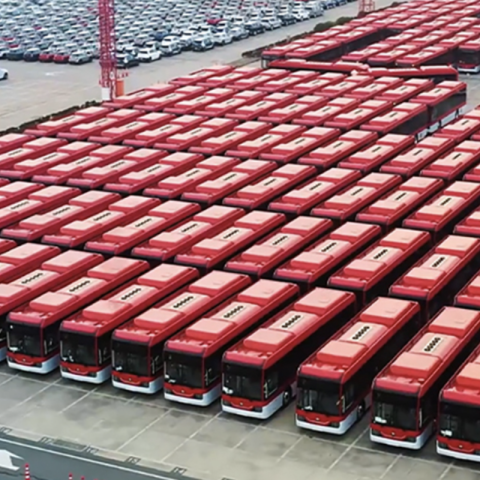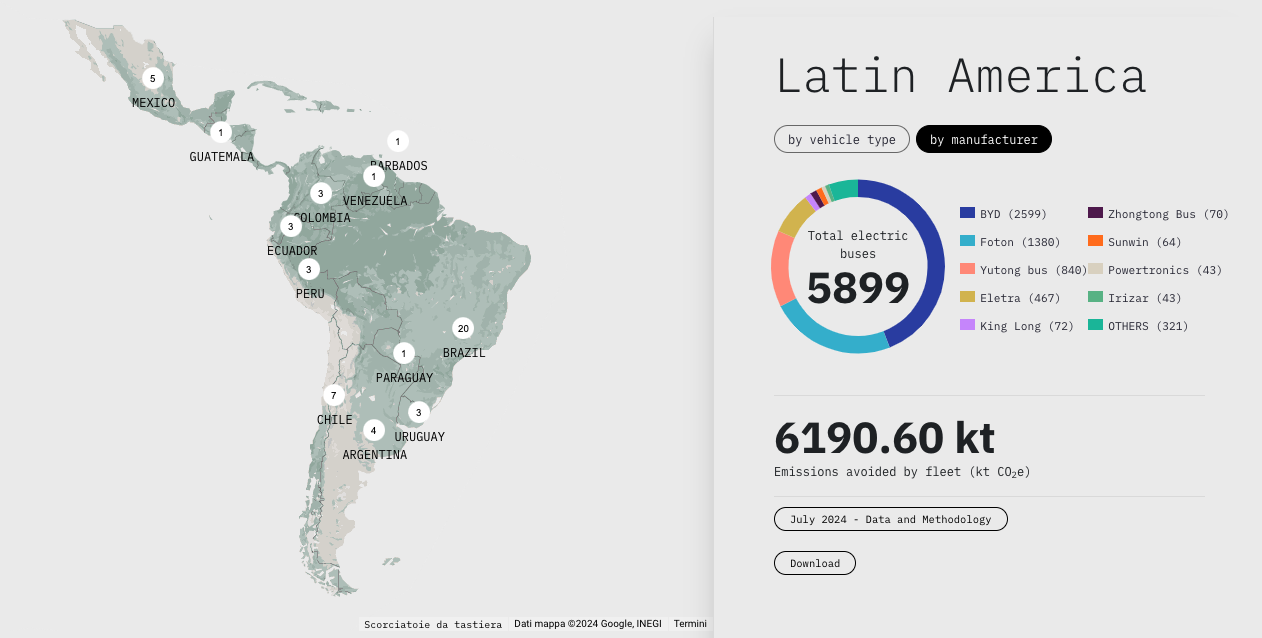5,900 e-buses are in operation in Latin America, with BYD, Foton and Yutong leading
Around 5,900 electric buses are in operation in 41 cities in 12 Latin American countries, according to data highlighted in the E-Bus Radar, whose update was launched during South American trade expo LAT.BUS 2024 in early August. Launched in 2020, the initiative, backed by the Zero Emission Bus Rapid-deployment Accelerator (ZEBRA), is the result of […]

Around 5,900 electric buses are in operation in 41 cities in 12 Latin American countries, according to data highlighted in the E-Bus Radar, whose update was launched during South American trade expo LAT.BUS 2024 in early August. Launched in 2020, the initiative, backed by the Zero Emission Bus Rapid-deployment Accelerator (ZEBRA), is the result of a collaboration between C40 Cities and the ICCT (International Council on Clean Transportation).
The E-Bus Radar platform was developed with the objective of monitoring and geo-referencing electric bus fleets in operation in Latin American cities. It also promotes data transparency and quantifies the CO2 emissions avoided thanks to the operation of these vehicles.
A study out in late 2023 forecasted that 25,000 e-buses are going to be deployed in Latin America by 2030.
BYD, Foton and Yutong leading e-bus market in LATAM

5,899 e-buses are tracked as of July 2024. BYD is leading the Latin America fleet with 2,600 units, followed by Foton (1,380) and Yutong (840).
Santiago de Chile is still a performance leader with 2,480 units operating – more than half of those are coming from Foton (1,338, 54% share), then BYD (791). And 214 Yutong buses are currently being delivered (as of August).
In total, Chile has 2,659 EV buses in operation, followed by Colombia with 1,590 units running (97% of those are BYD: 1,547; 93% are in operation in the capital city Bogotà, where the OEM has been awarded a tender for over 1,000 e-buses back in 2021). Quite far, in the third place, Mexico has 694 e-buses in service, with Yutong in the first place (70% share). Brazil has 602 e-buses in operation.
| Country | N. of e-buses operating as of July 2024 |
| Chile | 2,659 |
| Colombia | 1,590 |
| Mexico | 694 |
| Brazil | 602 |
| Ecuador | 106 |
| Argentina | 99 |
| Venezuela | 45 |
| Uruguay | 37 |
| Perù | 8 |
| Paraguay | 2 |
| Others | 57 |
| Total | 5899 |
E-Bus Radar: tracking e-buses in Latin America
E-Bus Radar offers a clear vision of the benefits of electric buses, showing the potential to prevent premature deaths by improving air quality in cities. According to the World Health Organisation (WHO), approximately 90% of the world’s population is exposed to high levels of air pollutants, with serious consequences for human health, such as respiratory and cardiovascular diseases. By replacing diesel buses, which contribute to air pollution and increased greenhouse gas emissions, electric buses represent an effective solution to this global problem.
“More and more cities are becoming convinced of the benefits these buses have compared to fossil fuel buses.The benefits are not only environmental, but also economic, as these buses have a favourable total cost of ownership, based on their lower operating costs in energy and maintenance”, says Oscar Delgado, ZEBRA Alliance Leader at the ICCT.
“Since its launch in 2019, the E-Bus Radar platform has established itself as a regional reference to provide transparent and accessible data highlighting the leadership of Latin American cities in decarbonising bus fleets, inspiring other municipalities to adopt cleaner and more efficient transport solutions”, assessed Thomas Maltese, Senior Manager of the ZEBRA Alliance at C40 Cities.







